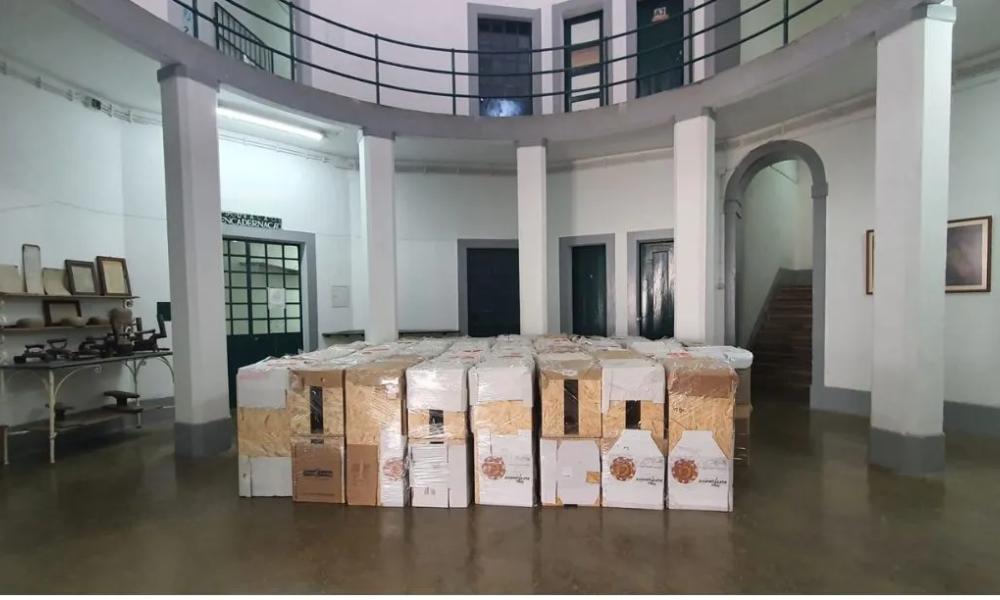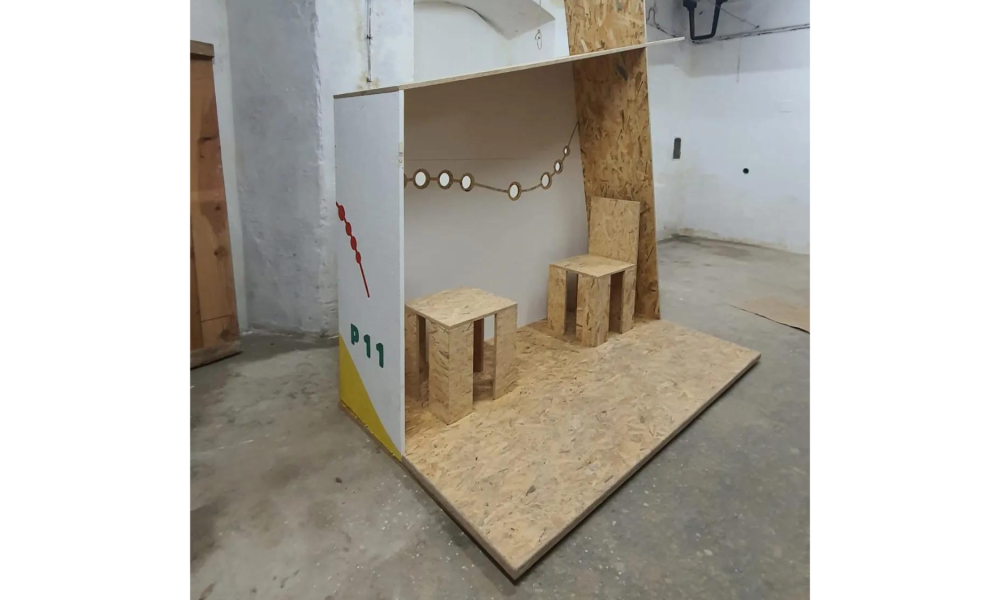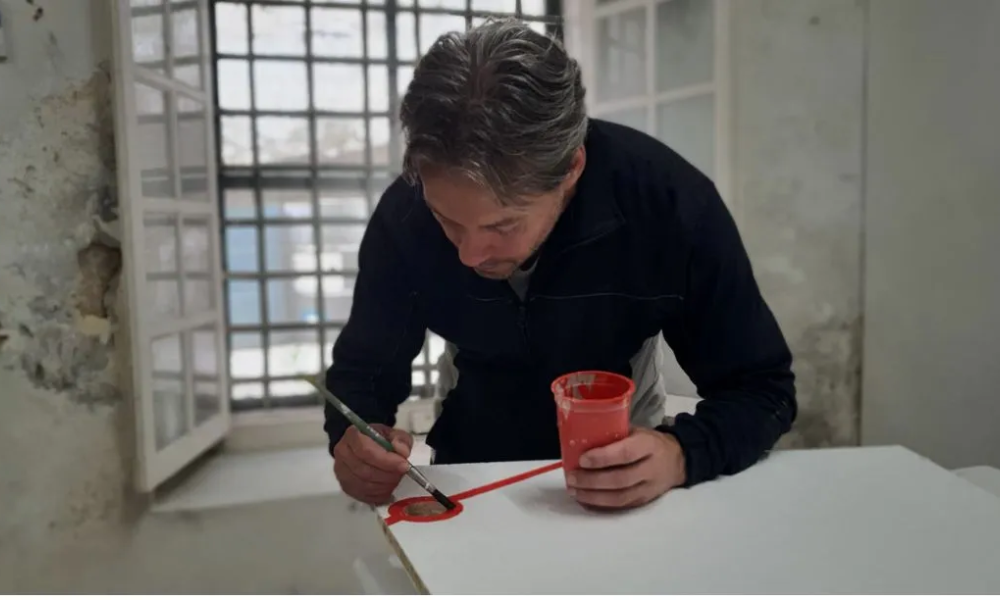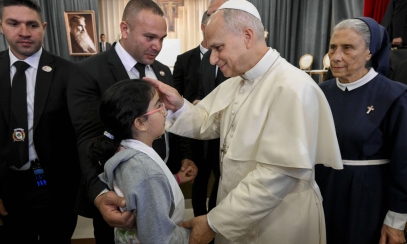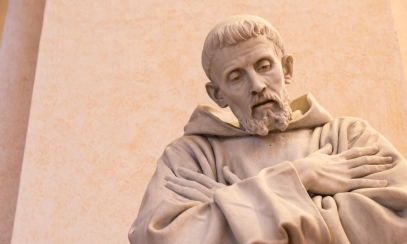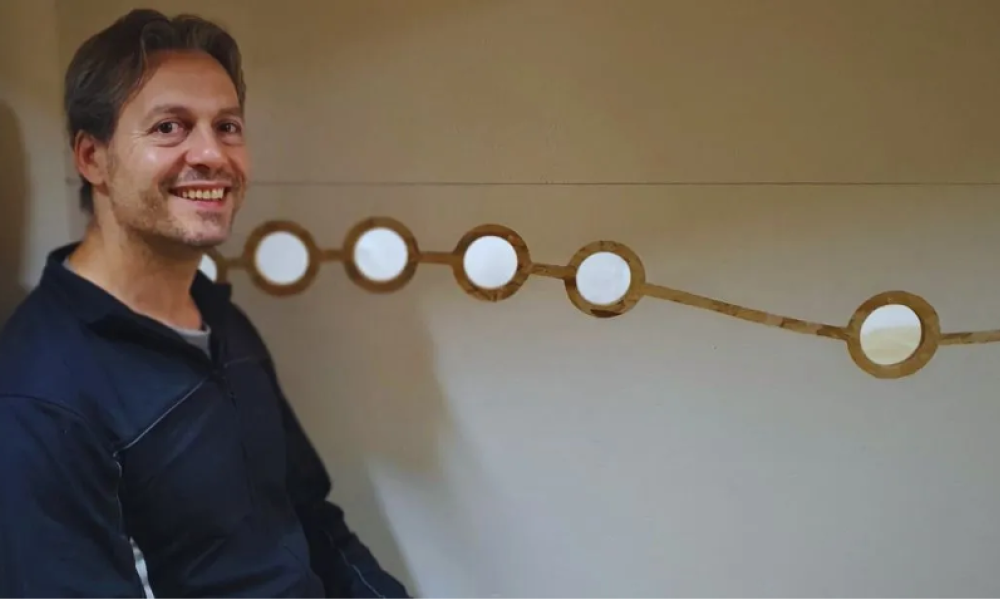
From Prison to World Youth Day: Man Builds 50 Confessionals to Be Used For Pilgrims
July 8, 2023 | Some things take time. Pedro Silva needed to reach the age of 50, celebrated in a high-security prison cell, to look back and understand the “signs” he received along the way.
July 8, 2023 | Some things take time. Pedro Silva needed to reach the age of 50, celebrated in a high-security prison cell, to look back and understand the “signs” he received along the way.
“I realized that God was always with me. He doesn’t give up on us, so we can’t lose hope,” he said with the smile of someone who believes he is about to start a new life.
A few days before being released after six years in jail for drug trafficking, Silva put the finishing touches on the 50 confessionals that, together with four other prisoners, he built for World Youth Day (WYD) 2023, which will take place in Lisbon, Portugal, Aug. 1–6 and will be attended by Pope Francis.
While still in prison, Silva told CNA about one of the first missions he will undertake post-incarceration — participating in WYD as a volunteer and helping to set up the confessionals in “Reconciliation Park,” which is being prepared in a Lisbon district called Belém (in English, “Bethlehem”), located alongside the Tagus River.
In all, 150 confessionals were built in three Portuguese prisons (Coimbra, Paços de Ferreira, and Oporto), following an agreement between the WYD Lisbon 2023 Foundation and the Directorate-General for Reinsertion and Prison Services, with the aim of valuing the professional skills of prisoners and contributing to their reintegration into society.
Upon learning of Silva’s intention, the WYD Local Organizing Committee was overjoyed.
“We are very interested in complying with his wishes and we will do all the necessary steps so that he can participate in the setting up of the confessionals,” assured the spokeswoman for the WYD Lisbon 2023 Foundation, Rosa Pedroso Lima.
The different pieces that make up the structure of each confessional, together with the benches that will be placed inside, are already packed and stacked, ready to go directly to Belém, where Reconciliation Park will be open from Aug. 1–4 between 10 a.m. and 6 p.m.
During this time, distributed among the confessionals will be priests of different nationalities (and, on the morning of Aug. 4, the pope himself), available to listen to pilgrims from all over the world who wish to receive the sacrament of reconciliation.
Coincidence or not, it was precisely in Belém, in the church of the Jerónimos Monastery, that Silva received baptism at the age of 12. Neither he nor his 12 siblings had been baptized as babies and never attended catechesis.
In the midst of a complicated childhood, with his parents absent and in the care of a grandmother, Silva remembers the day his religion teacher asked the classroom: “Who is still not baptized?” Silva was the only one to put his hand in the air, and that day he came home asking for the sacrament.
Silva’s grandmother had no idea who to invite to be his godparents. “I was a problematic child and she thought nobody would want it, but I suggested it could be my primary teacher and off we went to talk to her, who gladly accepted… I ended up keeping in touch with her throughout my life, until I came to prison,” he recalled.
Despite having been baptized, Silva did not remain connected to the Church. As an adult, he lived in Argentina for a few years and experienced another moment he will never forget.
“I went to the cathedral with my sister, who lived in Buenos Aires, and with her husband’s family, and we attended Mass.” The celebrant was none other than the then-Cardinal Jorge Bergoglio. “In other words, I had the privilege of being with the pope! And from then on, I really liked him,” he said.
Late catechesis and the right opportunity
Years later, living with another sister in Alicante, Spain, Silva was going through “a particularly difficult phase” and, desperate, he decided to pray.
“I was walking down the street and asked God to help me, to give me a sign. The next moment, I look down at the floor and see a folded magazine. I open it and it was an issue of Awake! by Jehovah’s Witnesses. So I looked up at the sky and said to God, ‘What? That fast?’”
Silva laughed as he shared his story, fondly recalling how he went out to the street where some members of Jehovah’s Witnesses used to be and spoke to them. “From then on, every week they came to the house to teach me about the Bible. It was there that I deepened my relationship with God.”
But when he moved to Vigo, another Spanish city, to work in a restaurant, he “didn’t have time for anything,” and his connection to religion was lost.
A new complicated phase in life marked by some mistakes eventually brought him back to Portugal, condemned to a six-year sentence at the Coimbra Prison. It was there that he learned that World Youth Day would take place in Lisbon, though he was still far from imagining he would ever see the pope he loved again. But when the challenge of the confessionals came and he was one of the five chosen to join the team that would build them, Silva felt that it was another sign from God and a new opportunity that appeared when he needed it most.
“I was very happy and grateful, and it makes me proud to know that in those confessionals there is a part of me and of my companions,” he said.
The fact that it was a better-paid job than usual in prison was extra motivation.
“When I found out that we were going to receive 10 euros a day, I immediately thought that it would be a good help so that, when I was released, I wouldn’t be so dependent on my family,” he said.
Made from recycled wood, supplied by the JMJ Lisboa 2023 Foundation, the confessionals have a simple structure, which Silva, already used to making more complex pieces in the prison’s carpentry shop, found easy to execute.
“And since we have a colleague on the team who is a real carpenter, we even improved what had been designed,” he pointed out with pride while showing one of the confessionals already completed and assembled in the workshop so that it can be photographed.
More prisoners at WYD?
Orlando Carvalho, who has been running the Coimbra Prison for 10 years, is also proud. “It is part of the tradition of this establishment to operate the workshop sector, with 13 different areas, including joinery and carpentry, so we immediately said yes when asked if we would like to participate in the construction of the confessionals,” he pointed out.
Projects like this, he said, “can be transformative and make a difference in the lives of inmates, because in addition to the practical and operational component of the work, they have a dimension and projection that other works do not have.” In the case of this specific project, “in addition to being better paid than usual, it has great public visibility, which gives them an empowerment that can be very positive,” he explained. Silva’s case is proof of that.
As the current director of the Coimbra Prison, Carvalho said he believes “more projects like this are sorely needed, which provide inmates with positive and structuring experiences and enhance their social reintegration,” especially because “society still hasn’t realized that, instead of pushing these people away or condemning them to oblivion, what it needs is to give them projects that add value both from a material point of view and from an emotional point of view.”
“Unfortunately, Pope Francis’ vision of prisons and inmates is not exactly the dominant one,” lamented Carvalho, who has followed Francis’ efforts to approach this “existential periphery” and further said that not only Silva but also other prisoners who are still in jail should be able to participate more directly in WYD.
“I think it would make perfect sense for prisoners to have an even more active participation, to be able to be present at some point in the World Youth Day and have contact with the pope,” he said. “Now, it is up to the Church and the General Directorate to find the ideal framework for this to happen... There are ways to do this. Not all 560 inmates of our establishment could go, but even if there were only a few it would be an important moment from a symbolic point of view.”
That indeed, he said, “would be a sign.” Not just for Silva, but “for everyone.”
Clara Raimundo is a Portuguese journalist who works for 7MARGENS, a digital newspaper that specializes in religion and human rights topics. She studied religious journalism at the Catholic University of Lisbon and has been the editor in chief of My Pope Magazine in Portugal.

